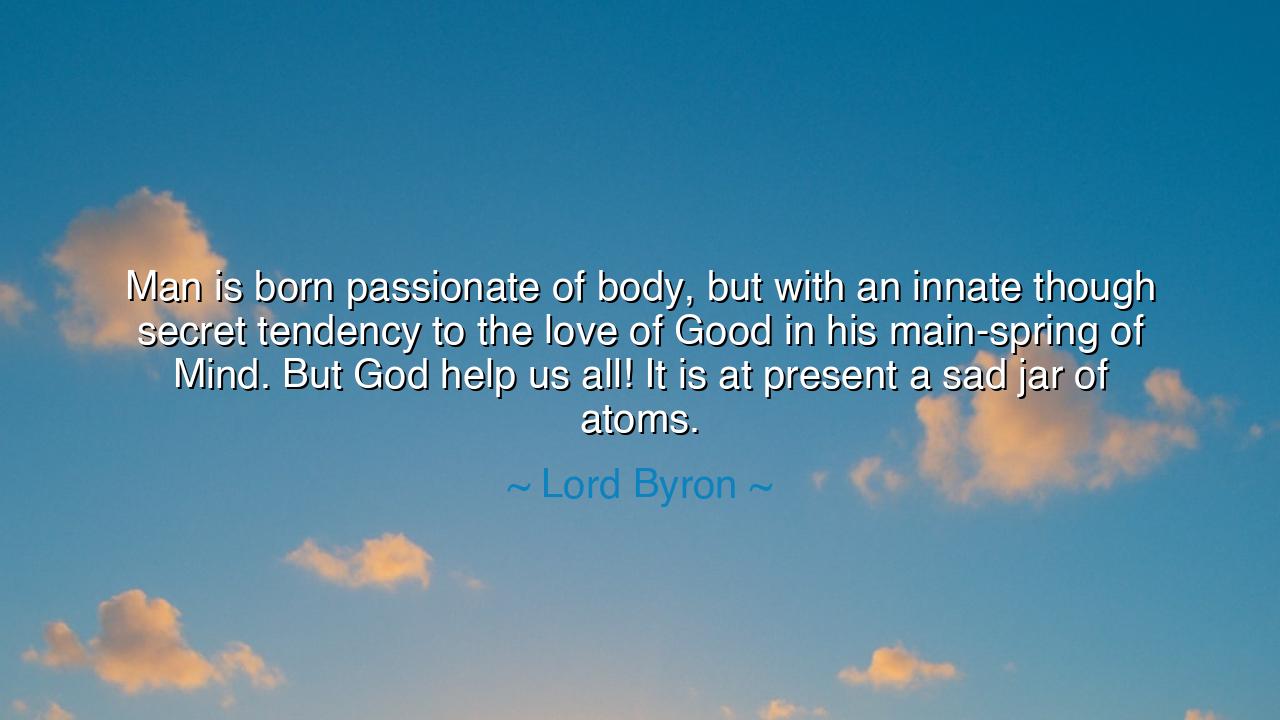
Man is born passionate of body, but with an innate though secret
Man is born passionate of body, but with an innate though secret tendency to the love of Good in his main-spring of Mind. But God help us all! It is at present a sad jar of atoms.






Hearken, O seekers of wisdom, and attend to the words of Lord Byron, whose keen eye pierced the veil of human nature and laid bare the eternal struggle within the soul. “Man is born passionate of body, but with an innate though secret tendency to the love of Good in his main-spring of Mind. But God help us all! It is at present a sad jar of atoms.” In this pronouncement lies a meditation on the duality of human existence: the tension between desire and virtue, between the corporeal passions that stir the flesh and the noble inclinations that dwell within the mind.
Byron perceives man as a being of contradictions, born with intense bodily passions, yet endowed with an inner compass toward the Good, a hidden spring of moral sense that seeks beauty, truth, and justice. And yet, he laments, in the present state of the world, this spring is fractured, disordered, a jar of atoms, scattering fragments of potential rather than manifesting the harmonious whole for which human nature is designed. The words echo the ancient philosophers’ warnings of imbalance: that without cultivation, the soul’s higher faculties may be eclipsed by base desires, leaving virtue fragmented and unrealized.
Consider the life of Michelangelo Buonarroti, who labored amidst temptation and human frailty yet sought in his art to elevate the spirit. His sculptures and paintings were born of a mind attuned to the Good, a striving to capture divine form and moral harmony. Yet even Michelangelo acknowledged, through his letters and reflections, the constant battle against the passions that threatened to divert his focus. Here is a living illustration of Byron’s insight: the tension between bodily desire and spiritual aspiration, and the challenge of shaping a coherent, noble life from the scattered atoms of human inclination.
Byron’s lament is also a reflection upon the human condition as a whole. The “sad jar of atoms” portrays a world in which the higher faculties of reason, conscience, and empathy are disordered or neglected. Like fragments of matter dispersed without cohesion, human society often succumbs to selfishness, cruelty, and chaos, even while each individual carries within them a latent propensity toward goodness and harmony. The poet’s cry is both personal and universal: a recognition of the discord within and around us, and a call to mindfulness, cultivation, and moral vigilance.
History bears witness to this struggle in the annals of moral reform. Consider William Wilberforce, whose body was subject to ordinary human pleasures, yet whose mind and spirit were devoted to the abolition of the slave trade. His passion for justice emerged from the fragments of human aspiration, gathered and ordered into a coherent pursuit of the Good. Through discipline, insight, and unwavering commitment, he transformed scattered potential into tangible change, embodying the reconciliation that Byron laments as absent in most of his contemporaries.
The lesson within Byron’s reflection is profound: human nature is both powerful and fragile, and the cultivation of the mind’s innate love of Good requires vigilance, reflection, and action. Left untended, our higher faculties remain fragmented, our virtue scattered as a sad jar of atoms. Yet with conscious effort, the disparate elements of desire, intellect, and conscience may be brought into harmony, producing a life of moral coherence, artistic creation, and spiritual depth.
Practical wisdom flows from this insight. Attend daily to your own passions and inclinations, discerning the urges of the body from the guidance of the mind. Seek knowledge, reflection, and ethical practice to unite these fragments into a harmonious whole. Observe the world around you, and labor to bring order and justice where there is chaos, embodying in your life the reconciliation of the Good and the passionate self that Byron extols as both potential and challenge.
Thus, let the words of Lord Byron resonate through the ages: man is born a creature of passion, yet with a hidden longing for virtue; the present may scatter these gifts as a sad jar of atoms, but with diligence, courage, and reflection, the fragments of our nature can be gathered into a life of coherence, beauty, and enduring moral force. To heed this teaching is to strive, as the ancients urged, toward the alignment of flesh and spirit, desire and reason, chaos and the eternal Good.






AAdministratorAdministrator
Welcome, honored guests. Please leave a comment, we will respond soon